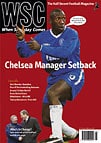 Rio might be complaining, but it could have been far worse: just ask Russia's Yegor Titov, Dan Brennan says
Rio might be complaining, but it could have been far worse: just ask Russia's Yegor Titov, Dan Brennan says
Compared to the “Titov Affair” the furore surrounding Rio Ferdinand’s drug test fiasco and subsequent ban has been all too mild. Like Ferdinand, Yegor Titov will be watching Euro 2004 from the comfort of the VIP box. The Spartak Moscow midfielder, who tested positive for traces of bromantan – an anti-fatigue drug developed by the Soviet military – prior to Russia’s play-off against Wales in Moscow last November, is now seeing out a 12-month ban from domestic and international football.
In spite of money spent on expensive lawyers and experts, Welsh efforts to have Russia disqualified ran out of steam in March, when UEFA threw out their appeal. The odds were always against Wales, as from the start UEFA’s finger of blame pointed firmly at player and club, not country, and the Russian federation helped their cause by taking swift measures.
Titov still claims he has no knowledge of how the bromantan appeared in his system. Much remains unclear about where the blame really lies, but increasingly questions are being asked about practices at Spartak Moscow. Immediately after the domestic ban imposed on Titov in February, Spartak sacked their team doctor. It seems unlikely, though, that he was supplying medication to team members without the knowledge of those higher up. Moreover, before Russia’s Euro 2004 qualifier in Dublin last September all Spartak players were withdrawn from the squad. This may be a coincidence, but it could also mean that there were concerns over practices at the club within the national set-up.
Portrayed in the Welsh media as a heroic David v Goliath struggle for justice, in Russia the Welsh were depicted as irritating and unsporting flies in the ointment. “For six weeks the only thing they’ve been thinking about in Cardiff is how to take Russia’s place,” scorned a lead story in Sport Express in March. “The Welsh FA is hardly among the richest, but the fact that they’ve splashed out big time to invite extremely highly paid medical and legal specialists to represent their case speaks volumes about how much they are daring to dream.”
Even Russia’s captain – the normally understated and diplomatic Viktor Onopko – was moved to comment: “I have to say I’ve lost all respect for Welsh football. They haven’t behaved like gentlemen. Titov has received his ban and has been made to suffer enough. The idea of punishing an entire country for the behaviour of one man is preposterous.”
Their passage to Portugal assured, the Russians nevertheless know that the Titov Affair has raised serious concerns within their domestic game. For their federation president, Vyacheslav Koloskov, the scandal represents an unwanted blight on his personal ambitions. Koloskov is busy lobbying to get himself elected on to UEFA and FIFA committees. But his zeal over the Titov case will doubtless meet with murmurs of approval in the Swiss corridors of power.
“In the past,” he admitted, “we thought we didn’t have a doping problem only because we didn’t do enough testing. We used to do random tests once in a while, after the Russian Cup final, for example, and after the odd league match. But in the past clubs have often refused to take the tests, because the rules weren’t defined properly. From now on we’ll take samples from two players from two Premier League clubs, drawn at random before every round of matches.” More rigorous testing is set to be backed up by a new law on drugs in sport, which will make provision for more sophisticated testing mechanisms, as well as stipulating more severe punishments for offenders.
Titov, meanwhile, claims he has been a victim of circumstance. “Everything, it seems, was against me, starting from the fact that the international campaign against drugs in sport was at its peak and ending with the death of the Italian cyclist Marco Pantani. It would have taken a miracle for my punishment to be overturned – and I don’t really believe in miracles. I’m just grateful the whole thing is over now – it’s played havoc with my nerves.”
He can console himself with the fact that he has been inundated with offers of work from the Russian media and is planning to keep his foot in by turning out for an amateur side.
Now there’s an idea. Perhaps Ferdinand should see if Salford City need a centre-back.
From WSC 207 May 2004. What was happening this month